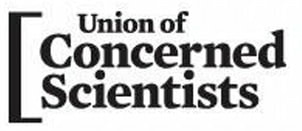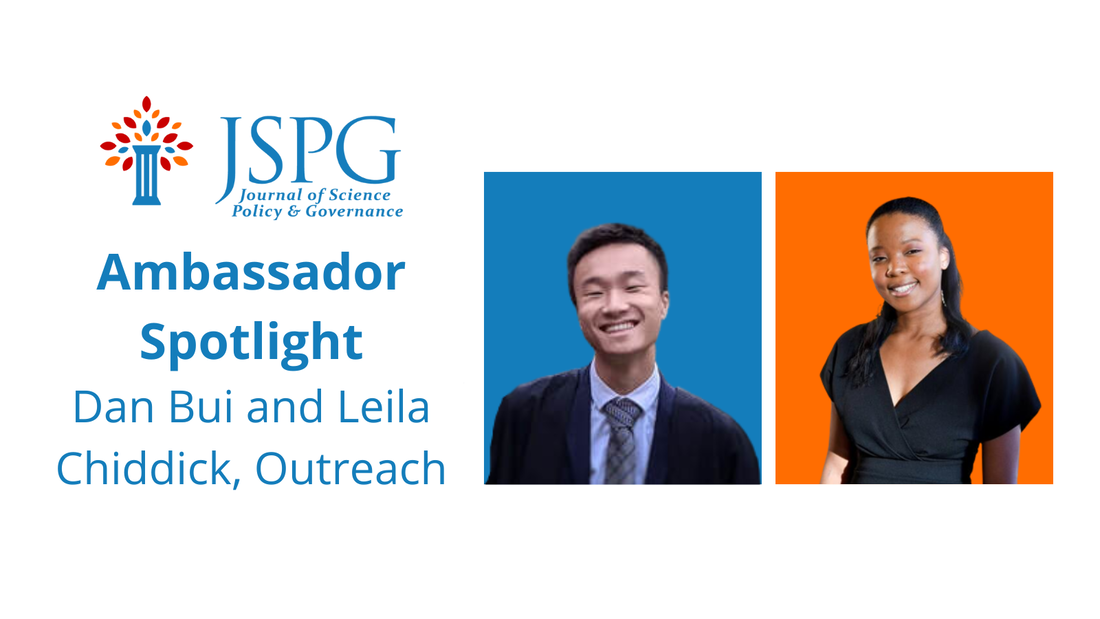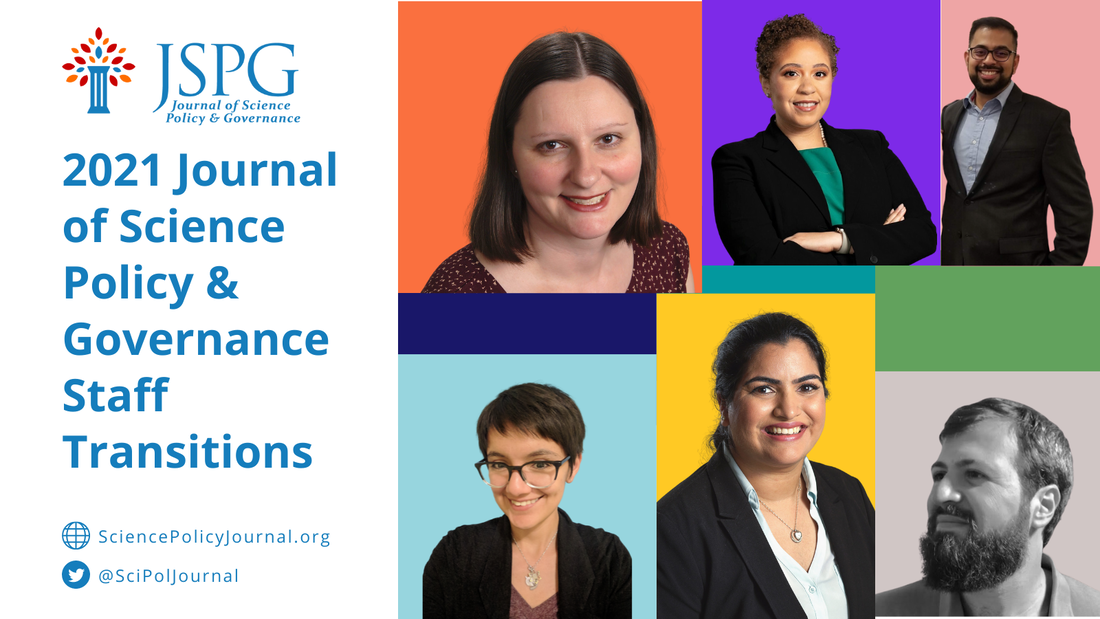|
We are proud to introduce our Ambassador Spotlight Series! Over the next few months, we will highlight each team of our inaugural JSPG ambassadors, starting with our Outreach team of ambassadors: Leila Chiddick, undergraduate at UCLA, and Dan Bui, an undergraduate at the University of Cambridge. Q: What brought you to JSPG? LC: My major is Global Studies, but also looking into minoring in Public Health and Disability studies. I found my interest in science policy last year through UCLA Science Policy group. From there I’m still learning about science policy, and the difference between more the legal side of science and healthcare law. So that's where my interest in JSPG began and where my educational path is leaning right now. DB: I spent a few months working with an NGO in Berlin working on digital technologies for healthcare access in rural Madagascar, during which I watched the process of academic research using the NGO’s findings from their trials. This research made me think about the limited opportunities for young scientists and policy professionals to publicize their research and I came to the JSPG from my enthusiasm about its ethos of the democratization of publication opportunities. Q: What is your group’s current project? How do each of you work within your group? DB: We work in outreach and our main goal is to raise awareness of JSPG, whether that be by encouraging fellowships and science policy groups to list JSPG on their resources pages on their websites or getting in touch with student societies and university faculties directly. Coming from the UK, I’m much more familiar with British and European university systems and the professional opportunities students here look for, so that’s where I’m concentrating my outreach work. LC: Dan is in the UK and I'm in California, so we have weekly meetings with our advisor, and so those are separate between the two of us and because of that, a lot of our work is separate. But when we create projects or different panels. We'll come together, and we'll all attend if we can, and support each other. For current projects, we just had a panel for Johns Hopkins science policy group for their undergrads and graduate students. I've been talking to a lot of undergraduate universities in the US so that they can provide an even better perspective for the students that attend these panels as well. We want to share who JSPG is, what this Ambassador program is, so they can do it in the future if they'd like to, and what science policy is. Q: What are some of the skills you have learned as part of your internship so far? How do you think you might apply these skills in a future role in outreach or science policy? LC: I think that something I’ll take away is just learning how to communicate with people in different ways, based on who I’m talking to, whether it's students, professors, and even trying to speak and connect with people over platforms. DB: Being persistent, finding the right people to contact, and not being afraid to chase people up (in a polite way!) My experience so far has really helped me to be familiar with what kind of organizations are interested in the JSPG’s mission so I can target outreach efforts more effectively. Q: How do you feel your group’s project will shape the future of outreach at JSPG? DB: I’m reaching out to student societies in the UK, particularly at the University of Cambridge where I’m based. Hopefully there’ll be more interest in the JSPG on this side of the Atlantic in future and bring more submissions as well. LC: Following up with groups we communicated with and worked with in the past as new members come through these organizations, especially universities. We still want to connect even if we’ve work with them in the past to keep those connections strong. Q: What has been the most exciting task you’ve encountered as a group so far? LC: For me, I’m working with a group called Science Rising focuses on trying to increase voter registration and people getting out to vote, especially undergraduate students and younger people who are in STEM. It’s interesting to see how they're doing that and exciting to work with people who are in other areas of science policy DB: Since a lot of our work has been individual instead of as a group, rather than an exciting task, when you get a reply from an organization that’s happy to spread the word about JSPG, it’s really uplifting. The Ambassador Spotlight Series is written and developed by the Communications and Public Affairs Ambassadors.
About the authors Katherine (Kate) Andersh is a PhD candidate in Neuroscience at the University of Rochester. She previously received her BS in Neuroscience and Cognitive Science from the University of Arizona in 2017 with a minor in Psychology. Her current research is focused on the role of inflammation in vision loss and cell death in glaucoma, one of the leading causes of blindness in the world. She is a former Science Communication Training Fellow with the Association for Research in Vision and Ophthalmology (ARVO). With this fellowship, she was able to communicate with both local and national legislators advocating for the importance of scientific funding as well as equity and inclusion efforts in STEM within the Rochester community. In addition, she has worked with many groups within her institution, including her time as vice president of the Alliance for Diversity in Science and Engineering, to advocate for the needs of underrepresented trainees and participate in larger university initiatives to support equity and inclusion. She is interested in pursuing a career in science policy and continuing to advocate for underrepresented voices in STEM and within the community. Hannah LeBlanc is a PhD student in Biology at the Massachusetts Institute of Technology. Her research focuses on microbial RNA biology and regulation of gene expression in bacteria. They graduated from Mount Holyoke College with a B.A. in Biochemistry, where she researched bacterial RNA-protein interactions. Hannah serves as an Associate Editor at the MIT Science Policy Review, and is interested in policy and advocacy around healthcare access and housing. Outside of science, they enjoy rowing, weightlifting, and playing hockey.
Over the past several months, the Journal of Science Policy & Governance (JSPG) has undergone a number of staff changes.
 The latest piece of the blog series with UCS is "Expanding Professional Development Opportunities for Scientists Beyond the Lab" authored by JSPG's former Editors in Chiefs Lida Beninson & Tess Doezema. Read it here. JSPG has partnered with Union of Concerned Scientists in a series of blog posts to introduce the journal as a platform for ECRs to publish policy pieces, discuss international science diplomacy and policy debate, illustrate the impact of JSPG on the career trajectory of past editors, and provide a perspective on how policy skills translate into science communication. Learn more. JSPG has partnered with Union of Concerned Scientists in a series of blog posts to introduce the journal as a platform for ECRs to publish policy pieces, discuss international science diplomacy and policy debate, illustrate the impact of JSPG on the career trajectory of past editors, and provide a perspective on how policy skills translate into science communication. Learn more.
|
JSPG NewsAll the latest news from the Journal of Science Policy & Governance. Archives
April 2024
Categories
All
|
- Home
- About
-
Volumes
- Volume 24 Issue 01
- Sigma Xi and Rita Allen Foundation - Civic Science for Transformative Policy Solutions to Societal Challenges
- Volume 23 Issue 01
- APS Policy and Governance on Science, Technology and Global Security
- IAI Development Policy and Global Change Science to Achieve the Vision of Sustainable Americas
- Volume 22 Issue 01
- GHFUTURES2030 Strengthening Youth-centered Policy and Governance of Digital Transformations in Health.
- UNESCO AND MGCY OPEN SCIENCE POLICIES AS AN ACCELERATOR FOR ACHIEVING THE SUSTAINABLE DEVELOPMENT GOALS
- Volume 21 Issue 01 >
- JSPG and UCL STEAPP Special Topics: Innovations in Science Diplomacy >
- Sigma XI-JSPG Special Issue: Re-envisioning STEM Education and Workforce Development for the 21st Century
- Volume 20 Issue 01
- JSPG Volume 19 Issue 01 (10 Years of Publishing)
- Special Issue: 2021 NSPN-JSPG Policy Memo Competition
- Special Issue: Shaping the Future of Science Policy
- JSPG-UK SIN Special Issue: Climate Change Solutions
- Volume 18 Issue 01
- Special Issue: 2020 NSPN-JSPG Policy Memo Competition
- Volume 17 Issue 01 (Supported by AAAS STPF)
- JSPG-UN MGCY Special Issue: Impacts of Emerging Technologies
- Volume 16 Issue 01
- Volume 15 (Supported by CSPC)
- Special Issue: 2019 NSPN-JSPG Policy Memo Competition
- Volume 14
- Volume 13
- Volume 12
- Volume 11
- Volume 10
- Volume 9
- Volume 8
- Volume 7
- Volume 6
- JSPG-UCS Special Issue: Healthy Food Policy
- Volume 5
- Volume 4
- Special Issue: Hot Topics 2013
- Volume 3
- Volume 2
- Volume 1
- Submit to JSPG
- Announcements
- Events
- Training
- Media Mentions
- Policy in action
- Podcast



 RSS Feed
RSS Feed
